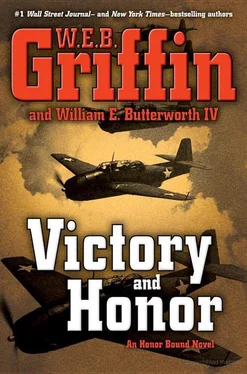Dulles and Frade looked at him in surprise.
Peter explained: “I’d like to see that my father’s body, presuming I can find it, is taken to Schloss Wachtstein and buried with my mother and my brothers.”
Dulles said: “Peter, I appreciate your feelings, but—”
“I’d like to go, too,” Boltitz put in. “I want to see if I can find out what happened to my father.”
“And I can appreciate that, too,” Dulles said, “but—”
“Perhaps I also could learn something about the U-boots we’re interested in,” Boltitz argued.
“I’m not sure that any of you going over there is a good idea,” Dulles announced. “And there is a simple solution to the problem. When I get to Washington, I’ll call David Bruce—he’s with Eisenhower, wherever that might be—and tell him to tell Ike to have SHAEF deny SAA permission to enter occupied Germany.”
Frade grunted, then looked past Dulles and saw Enrico Rodríguez coming toward them, and the women milling on the tarmac near the foot of the stairs.
“What did that sound mean?” Dulles challenged.
Frade turned to look at him and said, “That policy didn’t last long, did it?”
“Excuse me?”
“I seem to recall you telling me that since I was out on a limb, I was free to do what I think should be done.”
Dulles studied Frade for a long moment.
“Touché, Colonel Frade,” he said finally. “I also recall saying I would take responsibility for any action of yours. So, what I’ll do when I get to Washington is call David Bruce, tell him I’m sending you over there, and tell him to do what he can for you.”
“Thank you,” Frade said.
“One final comment, Clete,” Dulles said. “Please consider that when General Donovan, as he so often does, refers to you as ‘our loose cannon,’ he’s unfortunately often right.”
“Ouch!” Frade said.
Dulles put out his hand. Clete took it, then ordered, “Enrico, see that Mr. Dulles gets on his plane.”
“ Sí, Don Cletus.”
Dulles was barely out of earshot when von Wachtstein asked, “Was that a polite way of making it easier for you to tell Karl and me that we cannot go to Germany?”
“Probably, Hansel,” Clete said, “but the problem for you and Karl is not Dulles. It’s those two.” He nodded toward the back of the Lodestar, where Alicia von Wachtstein was sitting with Miss Beth Howell. “As far as I’m concerned, you guys need their permission, not Dulles’s.”
Clete knew that neither woman was going to be remotely thrilled to hear that the men they loved—and had just been reunited with—were about to leave them for war-torn Germany.
“I would suggest, Karl,” Clete said as they stood on the tarmac, “based on my long experience with a live-in woman, that you not broach the subject of you going to Germany with me until we’re on our way back from Mendoza. Unless you really meant that vow of celibacy you took.”
Von Wachtstein laughed.
Boltitz’s face turned red.
“Clete,” Karl said, “I have been meaning to discuss my relationship with Beth with you.”
“Yeah, I’ll bet you have, Karl. Confession is good for the soul!”
Von Wachtstein laughed again, this time louder.
“What are you three laughing about?” the baroness called.
“I don’t think you really want to know, Alicia,” Clete called back. “In case anybody needs to ‘freshen up,’ do it now. As soon as Dulles’s plane takes off, we go wheels-up for Mendoza.”
Casa Montagna Estancia Don Guillermo Km 40.4, Provincial Route 60 Mendoza Province, Argentina 1550 14 May 1945
Casa Montagna had been built by Clete’s Granduncle Guillermo after he returned from a tour of Tuscany and had had an out-of-character very good year at both the Hipódromo and the poker tables at the Jockey Club.
“In other words, damn the expense!”
Casa Montagna had been built on a natural plateau two thousand feet above the vineyards of the estancia. Carving a road up to it out of the granite of the foothills of the Andes had taken two years. The last—upper—kilometer of the road was so steep it had to be taken in a vehicle’s lowest gear.
The plateau was perhaps three hundred meters wide and two hundred meters long. A low stone wall on three sides kept people and animals from falling off the mountain.
The main house was built of natural stone and stood three stories tall. The third floor had dormer windows, and the red tile roof extended over a verandah whose pillars were covered with roses. From the front of the house, there was an unobstructed view of the Andes Mountains. The rear of the house was against what anywhere else would be called “the mountain” but here was referred to as “the hill.”
Enrico Rodríguez had told Clete that Clete’s mother had loved Casa Montagna, and also that it had been her last home in Argentina. It was from Casa Montagna that his parents had left to catch the train in Mendoza for Buenos Aires, and from there the ship that took them to New Orleans, where she had died in childbirth.
El Coronel Frade had never set foot in Casa Montagna again.
Clete Frade led Peter and Alicia von Wachtstein, Karl Boltitz, Beth Howell, and Enrico Rodríguez into the bar.
They found—sitting around tables holding a collection of bottles of various intoxicants and plates of cheese and sausage—Major Madison R. Sawyer III, Master Sergeant Siggie Stein, the Reverend Francisco Silva, S.J., Wilhelm Fischer, Otto Körtig, Ludwig Stoll, and el Subinspector General Pedro Nolasco. Pouring wine at the bar was the estancia’s manager, el Señor Pablo Alvarez.
“I was under the impression that cocktail hour began at seventeen hundred,” Cletus Frade announced sternly, hoping he sounded like an indignant lieutenant colonel who had just caught his subordinates at the sauce when they should have been about their duties.
Except for a few smiles and chuckles, he was ignored.
Sawyer, Stein, and Fischer quickly rose and, their hands extended, went to von Wachtstein and Boltitz. That civilized gesture quickly degenerated into hugs and embraces.
“I now believe it,” Körtig said. “I never thought you’d get away with getting them. Clete, you are truly an amazing man.”
“Please tell that to my wife, Otto,” Clete said.
Frade sat down beside Körtig, offered his hand to Pedro Nolasco and then to Stoll.
“If you would be so good, Ludwig,” he said. “Hand me that bottle of Cabernet Sauvignon before Pedro gets into it again.”
When the hugs and back-patting were over—as if suddenly remembering their manners—Boltitz and von Wachtstein, with their women following them, came to the table where Clete sat with Körtig.
Körtig and Stoll stood up.
“I know who you are, of course,” Körtig said. “But not which is who.”
Peter came to attention, clicked his heels, nodded, and said, “Peter von Wachtstein, Herr Oberstleutnant.”
Pedro Nolasco’s eyebrows rose.
Clete thought: I wonder how long it’s going to take to get Peter to get that Pavlovian reaction out of his system .
Körtig put out his hand. “I was privileged to be a friend of both your father and Claus von Stauffenberg, von Wachtstein. I’m very glad to see you here.” He paused and added, “Where we rarely come to attention and click our heels.”
Otto, Clete thought , you’re reading my mind .
“And where I am known as el Señor Körtig,” Niedermeyer finished.
“That was stupid of me, wasn’t it?” von Wachtstein asked after a moment’s reflection.
After pausing long enough to make it clear that he agreed with von Wachtstein’s assessment of his own behavior, Körtig then gestured at Stoll. “My deputy at Abwehr Ost, the former Hauptmann Ludwig Wertz, now known as el Señor Stoll.” Körtig paused, then asked, “And by what name are you now known?”
Читать дальше












